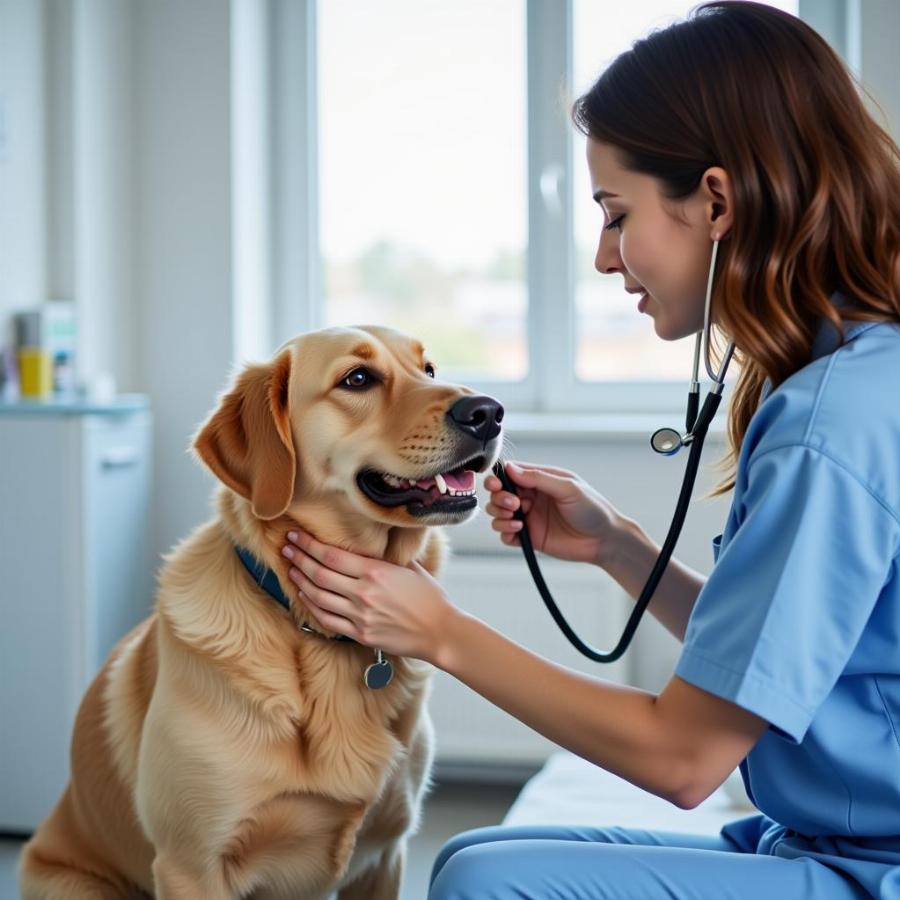As a loving dog owner, there are few things more frightening than discovering your furry friend has ingested something they shouldn’t have. If you’re here, chances are your canine companion decided glass was on the menu. It’s a terrifying situation, but don’t panic! We’re here to guide you through it.
This article will explain the potential risks, provide clear steps to take if your dog ate glass, and offer tips on preventing this hazardous situation from happening again.
Understanding the Danger When a Dog Eats Glass
Glass, unlike food, doesn’t break down in the digestive system. Instead, it can cause a range of complications, from minor cuts in the mouth to serious internal injuries. The severity depends on factors like the size and sharpness of the glass fragments, as well as your dog’s size and overall health.
My Dog Ate Glass: Immediate Actions
Discovering your dog ate glass warrants immediate attention. Here’s what you need to do:
- Stay Calm: Easier said than done, right? However, panicking can hinder your ability to take effective action. Take a deep breath and focus on the steps below.
- Remove Remaining Glass: Safely collect any remaining glass pieces. Avoid touching broken glass directly; use gloves or a dustpan. If the glass was part of a food item, remove access to the remaining food as well.
- Assess the Situation: Carefully check your dog’s mouth for any visible cuts or bleeding. If you see glass embedded, do not attempt to remove it yourself.
- Contact Your Vet Immediately: This is the most crucial step. Your vet is your best resource and can advise on the next course of action based on your dog’s specific situation.
What to Expect at the Vet
Be prepared to provide your vet with as much information as possible, including:
- The type of glass ingested (e.g., drinking glass, lightbulb)
- The approximate amount of glass consumed
- The time elapsed since ingestion
- Any symptoms your dog is exhibiting
Your vet may recommend a combination of the following:
- Inducing vomiting: This is most effective if done shortly after ingestion.
- X-rays: To determine the location and severity of any internal damage.
- Monitoring: Your vet might advise monitoring your dog at home for certain signs and symptoms.
- Surgery: In cases of severe internal damage or blockages.
 Veterinarian Examining a Dog with a Stethoscope
Veterinarian Examining a Dog with a Stethoscope
Preventing Future Incidents: Dog-Proofing Your Home
After addressing the immediate situation, focus on preventing similar incidents in the future. Here are some tips for dog-proofing your home:
- Clean Up Carefully: Always clean up broken glass immediately and thoroughly. Use a damp paper towel to pick up even the smallest shards.
- Store Breakables Securely: Keep glassware, vases, and other delicate items out of your dog’s reach.
- Mind Your Trash: Secure your garbage cans with lids that latch or store them in a closed cabinet.
- Beware of Decorations: Be mindful of decorations, especially during holidays, as these can be tempting for curious pups.
Signs Your Dog Needs Immediate Veterinary Attention
Even if you didn’t witness your dog eating glass, be vigilant for these warning signs:
- Vomiting
- Loss of appetite
- Lethargy or weakness
- Abdominal pain or swelling
- Blood in vomit or stool
- Constipation
- Changes in behavior, like pacing, whining, or restlessness
If you notice any of these signs, contact your vet immediately.
Recognizing the Importance of Quick Action
Time is of the essence when your dog eats glass. Early intervention significantly increases the chances of a positive outcome. Don’t hesitate to reach out to your vet for guidance and support.
Need More Help? Contact Beaut Dogs!
Beaut Dogs is your one-stop resource for all things dog-related. We provide reliable, insightful, and in-depth information on the wonderful world of dogs. From breed characteristics and care tips to training advice and product recommendations, we’ve got you covered. Visit us at https://beautdogs.com for more helpful resources and guidance on caring for your furry friend.
For specific questions or concerns regarding your dog’s health or well-being, remember to contact your veterinarian for personalized advice. When in doubt, always err on the side of caution and seek professional veterinary assistance.